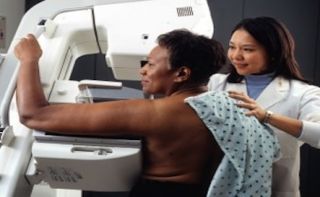Fear
Mammography: Saving Lives or Overdiagnosis Overkill?
In response to last week’s blog post: "Was Angelina Jolie 'Medically Hexed?'”
Posted May 21, 2013

In response to last week’s blog post Was Angelina Jolie “Medically Hexed?” many of you wrote to me asking my medical opinion on screening mammography. So… gulp… here we go. You asked. Mind you, this is simply my understanding of the very complex data – and this blog post is all about my personal opinion and how I came to it – but I totally respect your right to have a very different one! If you or someone you love has had your life saved as the result of mammography, I’m so glad this technology has helped you. My father was a radiologist specializing in mammography, and he’d probably roll over in his grave if he read what I’m about to write. But as I said, this is just my humble opinion. Because you asked.
Like genetic testing for things like the BRCA gene, screening for breast cancer is not a black and white issue, so I can’t give you a simple “Thumbs up” or “Thumbs down” on whether I think all women should or shouldn’t be getting mammograms. Like many medical decisions, it’s very personal, and each woman has to choose for herself what is right, based on her family history, her threshold for risk-taking, her tendency to fear the unknown, and her analysis of the data that shows that while early screening may save lives, it also leads to a great deal of what researchers call “overdiagnosis” and “overtreatment.”
Keep in mind that what I’m about to talk about is screening mammography, not diagnostic mammography. Screening mammograms are performed when there’s no breast lump or other worrisome breast abnormality, while diagnostic mammograms are performed when there is a known breast abnormality, such as a lump or an abnormal screening mammogram.
I’m also not talking about women with strong family histories or known BRCA gene status. For those women, I strongly recommend regular mammography and follow up with biopsies when necessary.
As you’ll be able to tell if you read old blog posts of mine, I was always pro-mammogram until I started researching the book I’m currently writing The Fear Cure: Cultivating Courage As Medicine For The Body, Mind & Soul (the sequel to Mind Over Medicine: Scientific Proof That You Can Heal Yourself.) In my research, I’ve uncovered shocking data about breast cancer screening that I’ll share with you in this post.
Overdiagnosis Of Cancer
A study published in the Journal of the National Cancer Institute estimates that 25% of breast cancers detected on mammogram, 50% of lung cancers diagnosed by chest X-ray and sputum analysis, and 60% of prostate cancers diagnosed by prostate specific antigen (PSA) are “overdiagnosed.” The study also evaluated overdiagnosis of neuroblastoma, thyroid cancer, melanoma, and kidney cancer.
The authors of the study define “overdiagnosis” as “the diagnosis of a ‘cancer’ that would otherwise not go on to cause symptoms or death.” Overdiagnosis is not the same as misdiagnosis, which implies that the pathologist made a mistake looking at the specimen under a microscope. Overdiagnosis of cancer suggests that the cancer exists, but that it is clinically irrelevant – that left untreated, it would either regress spontaneously (we know this happens) or the patient would die of something else before the cancer caused symptoms or death. The authors describe how these overdiagnoses can harm patients and reduce quality of life. Such overdiagnoses lead to medically unnecessary procedures, such as radical surgery and treatments known to predispose to future cancers, such as chemotherapy and radiation, which can cause leukemia and other malignancies.
The authors of the study conclude, “Whereas early detection may well help some, it undoubtedly hurts others. In general, there is no right answer for the resulting trade-off—between the potential to avert a cancer death and the risk of overdiagnosis. Instead, the particular situation and personal choice have to be considered.”
But Doesn’t Mammography Save Lives?
Yes. It does. For every 2,000 women invited to screen for breast cancer over a period of 10 years, one death from breast cancer will be avoided (thank God!) but this life saved comes at a price. Ten healthy women – who didn’t need treatment because they would have never become symptomatic or died from their disease – will wind up diagnosed and treated for breast cancer unnecessarily.
Then why are doctors relentlessly pressuring women to get mammograms? Because early studies back in the 1980’s suggested that mammography reduced breast cancer mortality by up to 25%. More recently, the U. S. Preventative Services Task Force estimates that the benefit of mammography is about a 15% reduction in the risk of dying of breast cancer. But that assumes that every woman diagnosed with breast cancer would have died of it, and fortunately, treatments have improved so much that this is no longer true. Most women diagnosed with breast cancer based on screening mammography do not die from it.
Late Stage Breast Cancers Are Not Decreasing With Screening Mammography
Instead, more women are being diagnosed with early stage breast cancers without a commeasurate decrease in the number of late stage breast cancer diagnoses. After screening mammography was introduced, 1.5 million additional women were diagnosed with early stage breast cancer, which would be great if that meant 1.5 million fewer diagnoses of late stage breast cancer. But that’s not what happened. Only 0.1 million fewer women were diagnosed with late stage breast cancer, meaning that most of the women diagnosed with breast cancer were overdiagnosed. They were never destined to develop symptoms or die from breast cancer, but they got treated anyway.
How can this be?
Shocker Alert: Early Breast Cancers Can Spontaneously Regress
A Norwegian study that compared 109,784 women who were screened only once in six years to another group of 119,472 women who were screened every two years found that the group that got mammograms more often had 22% more invasive breast cancer diagnoses than the group that got screened only once. How do you explain this? The Norwegian researchers concluded that the extra mammograms found some invasive breast cancers that would have disappeared if left untreated.
In other words, some invasive breast cancers would have spontaneously resolved if they hadn’t first been diagnosed and treated.
Additionally, mammograms are an imperfect science, missing one quarter of cancers that are destined to appear during the following year after screening.
The Unsatisfying Math
So what’s the real benefit of screening mammography? Well, it’s largely a function of age. Two thousand 40 year old women must be screened over ten years in order to prevent one breast cancer death. By the age of 70, 2.3 women will benefit for every 1,000 women screened for ten years – but the remaining 997.7 women will not benefit.
How can this be, when the word on the street is that mammography saves lives and should be offered to every woman?
The vast majority of women simply aren’t destined to get breast cancer, and among those who are, two-thirds will be successfully treated even if they don’t benefit from early diagnosis. In other words, screening asymptomatic women without breast lumps might catch cancer early, but it might be catching cancers that don’t need to be caught, putting women at risk of unnecessary surgery, radiation, chemotherapy, anxiety, pain, and suffering.
2009 Screening Mammography Guidelines
Based on the concern for overdiagnosis and overtreatment, the U. S. Preventive Services Task Force changed its recommendations in November, 2009. The new guidelines no longer recommend screening low risk women younger than 50 or older than 75, and among women 50-74 years of age, mammograms are recommended not yearly, but every other year. They also recommended against teaching breast self examination to patients.
Although there was a public outcry when these new guidelines were announced (I was among the ones to initially balk,) when you examine the data, you can’t help concluding that our quest to do good may actually be causing more harm. Why? Because we’re afraid of missing something, and our fear leads us to do too much.
Will I Get Screened?
So what decisions have I made about breast cancer screening? I had a baseline mammogram at 40 before I became fully aware of this data, but I’ve opted not to do further screening in my forties. I just turned 44, and I’ll reassess the data when I turn 50. I’m looking more into the data around breast thermography, but I won’t go into that in this post (since it’s already too long!) Suffice it to say that, unless new data arises, I’ll probably choose to examine my own breasts (I am an OB/GYN after all!), consider thermography depending upon my analysis of the data, and get mammograms if I ever feel anything even remotely suspicious.
What Will YOU Do?
This is a very personal decision, and I support your right to do whatever feels right for you. As I teach in Mind Over Medicine, your body is YOUR business (not mine or any other doctor’s), so you have to write The Prescription for yourself based on the wisdom of your Inner Pilot Light.
What will you do? Share your thoughts and comments below.
P.S. Just a note to everyone: I’ve switched up my blogging/newsletter schedule to Tuesdays and Thursdays.
With love for breasts everywhere,
Lissa Rankin
Lissa Rankin, MD: Creator of the health and wellness communities LissaRankin.com and OwningPink.com, author of Mind Over Medicine: Scientific Proof You Can Heal Yourself (Hay House, 2013), TEDx speaker, and Health Care Evolutionary. Join her newsletter list for free guidance on healing yourself, and check her out on Twitter and Facebook.




